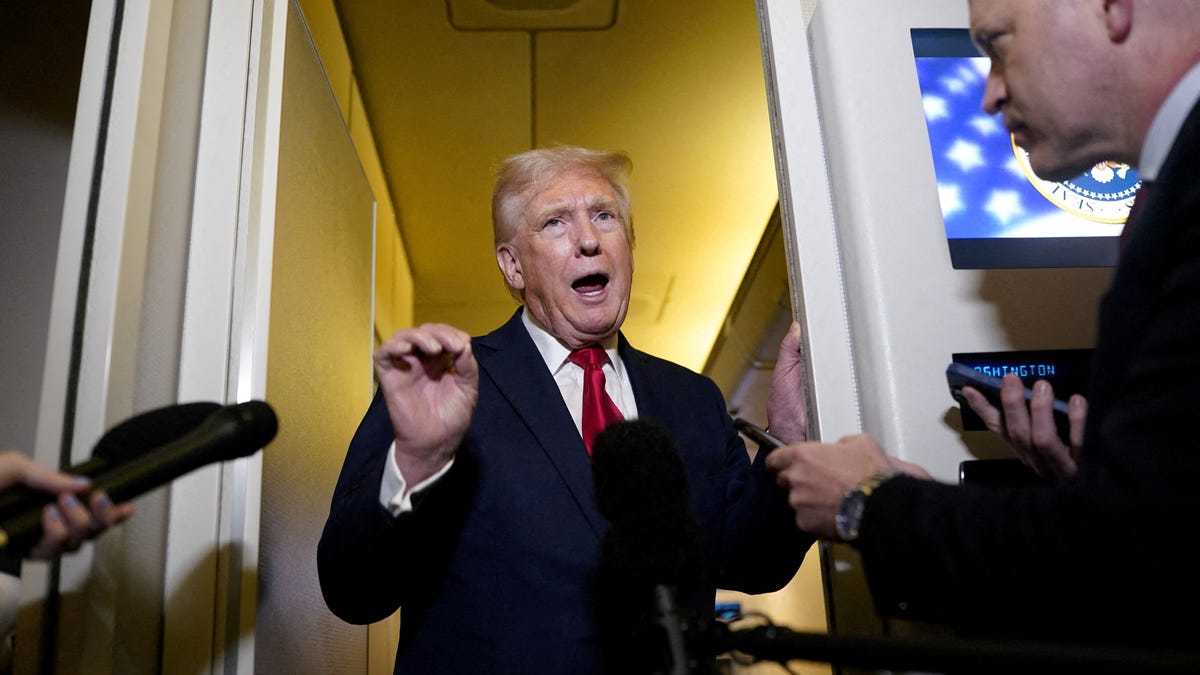‘50501’ protests against Trump rally across US
Thousands of protesters rallied across the U.S. to voice their opposition to President Donald Trump’s administration and policies.
- Americans’ confidence in Trump’s economic leadership has declined significantly since November.
- Disapproval of Trump’s tariffs is widespread, and his overall approval rating has dipped.
- While Trump retains strong support from his base, his approval among swing voters has eroded.
Most Americans now express little or no confidence in how President Donald Trump is handling the economy, a Pew Research Center survey shows, a vulnerability in an area that has long been a source of his political strength.
As Trump approaches the 100-day marker of his second term, nearly 6 in 10 disapprove of the tariffs he has imposed, while their predictions about what’s ahead in the economy have darkened.
The findings underscore the challenges for the president as he pursues sweeping and fundamental change, from reshaping the federal government to transforming the global trading system.
While he retains the solid backing of his core supporters, the survey signals that he has not yet persuaded most Americans that he is on the right course.
The poll of 3,589 U.S. adults by the nonpartisan think tank was taken online and by phone from April 7 to April 13, a tumultuous moment in the tariffs debate. It has a margin of error of plus or minus 1.8 percentage points.
Among those surveyed, 40% approved of the overall job he is doing as president; 59% disapproved.
That’s a decline of seven percentage points since February, reflecting some erosion among the swing voters crucial to his victory in last November’s election.
His strong supporters remained unshakable, at 96% approval. But among Trump voters who supported him less strongly, approval has declined to 75% from 88%, down 13 points in two months.
A flip on views of Trump and the economy
In most modern presidential campaigns, concerns about the economy − inflation, jobs, growth − have been the dominant issue. That includes 2024, when Trump hammered the Biden administration for not doing enough to control rising costs.
Trump was favored over Biden and over 2024 Democratic nominee Kamala Harris for his ability to handle the economy.
Since the election, though, Trump has lost some of that trust.
Last November, Americans, by a margin of 59% to 40%, said they were very or somewhat confident about Trump’s ability to make good decisions about economic policy. In the new poll, that assessment has flipped. Now, 54% say they have little or no confidence in his handling of the economy, while 45% are confident − a huge swing from a net 19-point approval to 9-point disapproval.
Investors have demonstrated their nervousness about the economy with a rollercoaster stock market.
All that may have contributed to Trump’s recent moves to modify his rhetoric and attempt to smooth some economic waters. He has set a 90-day pause on some of the steepest tariffs, entered into negotiations with China and other nations, and declared on Tuesday that he didn’t plan to try to fire Federal Reserve chair Jerome Powell, as he had suggested he might.
The traditional 100-day marker, a measurement dating to President Franklin Roosevelt’s first term, isn’t a reliable indicator of how an administration will eventually fare. It often falls before the defining events of an administration, such as the 9/11 attacks, which happened nearly eight months into George W. Bush’s first term and the coronavirus pandemic, which hit in the third year of Trump’s first term.
But the 100-day mark does offer an early check on how Americans think the new president is doing and an indication of whether he has expanded the coalition that elected him or lost ground.
In this poll, Trump’s troubles don’t seem to have provided a boost for Democrats.
More Americans now have a favorable view of the Republican Party, at 43%, than the Democratic Party, at 38%. That’s a change from recent years and a critique that extends to the party’s own members: Just 75% of Democrats now have a favorable view of their party.
What do Americans like most about Trump so far?
Asked to describe what they liked most about the new administration’s actions, 30% of those surveyed replied “nothing.” Another 20% mentioned immigration actions, including deportations and border security.
Asked to describe what they liked least about the administration, 22% of the responses centered on how Trump governs, volunteering that he acted in an authoritarian manner, cared only about himself or ignored the courts.
The imperative for the White House to obey federal court decisions was one of the few areas in which Republicans and Democrats generally agreed.
Two-thirds of Republicans (65%) and nearly all Democrats (91%) said the Trump administration would need to stop an action if a federal court ruled it illegal. Those numbers rose to 82% among Republicans and 95% among Democrats if the ruling came from the Supreme Court.
Still, that means nearly a third of Republicans (30%) said the White House didn’t need to follow a federal court ruling, and 14% said it could ignore a decision even if it came from the high court.
On a list of 10 major issues, from the economy to foreign policy to health care, a majority of Americans said they lacked confidence in Trump’s judgment on all 10 of them.
The president’s strongest rating was on immigration, with 48% expressing a fair amount of confidence, 52% not much.
Trump earned his lowest rating for his ability to “bring the country together.” By 2-1, 67% to 33%, those surveyed expressed little confidence in his ability to unite Americans.
